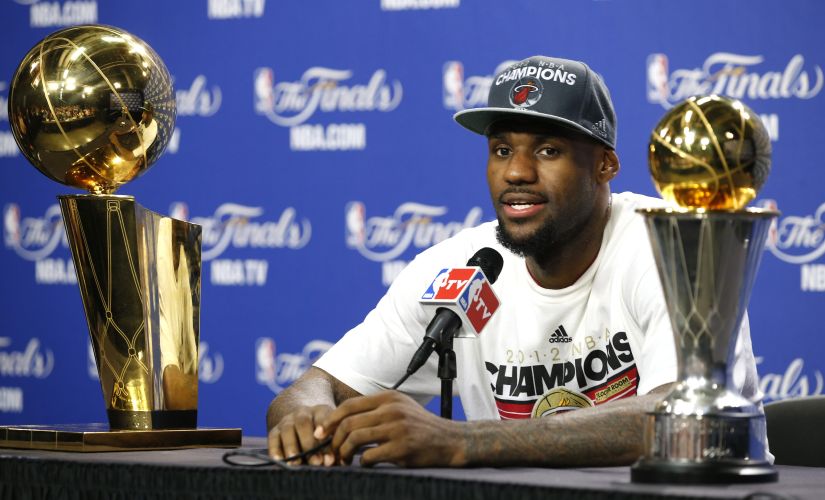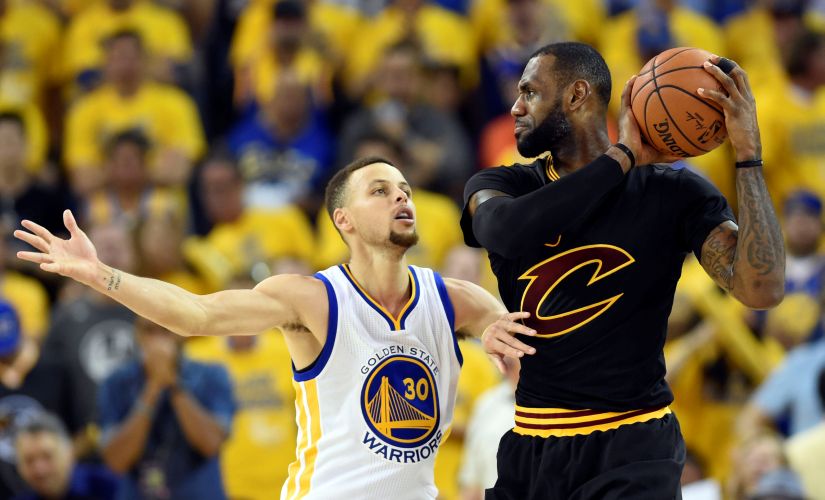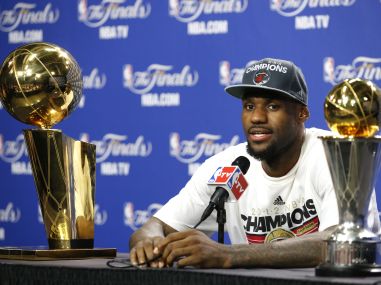Ten years ago, LeBron James — one of basketball’s greatest — defied expectations and made the NBA Finals for the first time. James was the central force around a thoroughly unimpressive Cavaliers roster, featuring Larry Hughes, Drew Gooden, and Zydrunas Ilgauskas, and still carried them to 50 regular season wins. In the Eastern Conference Finals, Cleveland defeated the talented and experienced Detroit Pistons 4-2, in a series that included James’s first signature moment of genius, a 48-point performance in Game 5. In the 2007 Finals, however, the Cavaliers simply did not have enough against the dominant San Antonio Spurs, who swept the series 4-0. A young James was still an unpolished player, and his shooting woes made it easy to limit him and his wide-eyed teammates. The loss was the first major disappointment of his career, but his entry at the game’s biggest stage gave a sign of bigger things to come. [caption id=“attachment_3503013” align=“alignnone” width=“825”] Cleveland Cavaliers’ LeBron James (L) is stuffed by San Antonio Spurs’ Tim Duncan in Game 1 of the NBA Finals in 2007. Reuters [/caption] James and his team improved. He won two MVP awards and played with better surrounding talent. The Cavaliers, however, failed to make the Finals for the next three years. In 2010, the Boston Celtics brought Cleveland’s postseason hopes to another early end in the second round of the playoffs. James left the arena in frustration. For the fans, the disappointment had turned into doubt, and the doubt into hate. We couldn’t have been more wrong: the 2010 loss to the Celtics was the last time James lost a playoff series in the Eastern Conference. Between playing for Miami and Cleveland, while leading some of the most stacked group of superstars in the NBA, James has now won seven consecutive Eastern Conference titles, taking his teams to the Finals for seven straight years and winning three of the first six championships. A fourth could be in the cards when the 2017 Finals begin this week. It all began in the summer of 2010, when James made a bold and divisive decision to take his talents to the Miami Heat and team up with superstars Dwyane Wade and Chris Bosh. He was now the centrifugal force in the NBA’s most-stacked roster. The Heat started slow but soon revved up to finish as the Eastern Conference’s second-seed. After beating the 76ers and Celtics in the first two rounds, their biggest challengers in the East were the Chicago Bulls, led by the 2011 MVP Derrick Rose. Despite going down early in the series, James and Wade stepped up to the plate to bounce back and see the Bulls off in six games. James had returned to the Finals after four years. But this was where his engine came to an abrupt halt, as he put up a pedestrian performance against the Dallas Mavericks and the Heat lost the series. Determined to make amends, James and the Heat returned to the Finals a year later. He won his third MVP award in the regular season and in the playoffs, it was the Celtics, his tormenters in the past, that pushed him to another signature performance in the Conference Finals: a memorable 45-point, 15-rebound line in Game 6, and 31-12 in the deciding Game 7. Against the inexperienced Thunder in the Finals, James did not repeat past mistakes and won his first championship, 4-1. [caption id=“attachment_3503025” align=“alignnone” width=“825”]
 Miami Heat’s LeBron James sits with the Larry O’Brien trophy (L) and the Bill Russell NBA Finals MVP trophy during a press conference after his team won the title in 2012. Reuters [/caption] With the pressure of an NBA championship off his back, James and the Heat were brilliant in 2012-13, winning 66 games while James won his fourth MVP trophy. The Heat disposed of the Bucks and the Bulls easily in the first two series in the playoffs, before surviving the Pacers in a gruelling seven-game matchup to make the Finals for a third consecutive year. In an all-time classic Finals series, James helped his side defeat the Spurs for his second title. The aging Heat had one last run left in them in 2013-14. In their final season together, James, Wade, and Bosh won the East for a fourth consecutive year, defeating the Hornets, Nets, and Pacers in the process. In a Finals rematch against the Spurs, however, James came up short and San Antonio got their revenge in an impressive 4-1 victory. James could sense the end of an era, and in the 2014 summer, he made his second divisive decision: a return to his old stomping grounds in Cleveland. Now, he formed a new, younger “Big Three”, joining hands with two more of the best players now in the East: Kyrie Irving and Kevin Love, who came in exchange for Cavaliers First Round pick Andrew Wiggins. James, Irving, and Love helped Cleveland turn around their fortunes to become one of the best teams in the East again. Love was unfortunately injured early in the playoffs, but nothing could stop James’s command of the East. With victories over the Celtics, Bulls, and Hawks in the playoffs, the Eastern Conference champion was once again a familiar face in a new place. The Cavs made the Finals, but short-handed against the juggernaut Golden State Warriors, they lost 4-2. There was really no stopping a healthy Cavaliers in 2015-16, as they finished atop the conference in the regular season and suffered only two defeats in three playoff series to make the NBA Finals, a sixth-straight time for James. The Finals will be remembered for his virtuoso performance against the Warriors in the face of adversity, as he helped his team overcome a 3-1 deficit to win the series 4-3, James’s third NBA title and first for his original Cavalier franchise. [caption id=“attachment_3503043” align=“alignnone” width=“825”]
Miami Heat’s LeBron James sits with the Larry O’Brien trophy (L) and the Bill Russell NBA Finals MVP trophy during a press conference after his team won the title in 2012. Reuters [/caption] With the pressure of an NBA championship off his back, James and the Heat were brilliant in 2012-13, winning 66 games while James won his fourth MVP trophy. The Heat disposed of the Bucks and the Bulls easily in the first two series in the playoffs, before surviving the Pacers in a gruelling seven-game matchup to make the Finals for a third consecutive year. In an all-time classic Finals series, James helped his side defeat the Spurs for his second title. The aging Heat had one last run left in them in 2013-14. In their final season together, James, Wade, and Bosh won the East for a fourth consecutive year, defeating the Hornets, Nets, and Pacers in the process. In a Finals rematch against the Spurs, however, James came up short and San Antonio got their revenge in an impressive 4-1 victory. James could sense the end of an era, and in the 2014 summer, he made his second divisive decision: a return to his old stomping grounds in Cleveland. Now, he formed a new, younger “Big Three”, joining hands with two more of the best players now in the East: Kyrie Irving and Kevin Love, who came in exchange for Cavaliers First Round pick Andrew Wiggins. James, Irving, and Love helped Cleveland turn around their fortunes to become one of the best teams in the East again. Love was unfortunately injured early in the playoffs, but nothing could stop James’s command of the East. With victories over the Celtics, Bulls, and Hawks in the playoffs, the Eastern Conference champion was once again a familiar face in a new place. The Cavs made the Finals, but short-handed against the juggernaut Golden State Warriors, they lost 4-2. There was really no stopping a healthy Cavaliers in 2015-16, as they finished atop the conference in the regular season and suffered only two defeats in three playoff series to make the NBA Finals, a sixth-straight time for James. The Finals will be remembered for his virtuoso performance against the Warriors in the face of adversity, as he helped his team overcome a 3-1 deficit to win the series 4-3, James’s third NBA title and first for his original Cavalier franchise. [caption id=“attachment_3503043” align=“alignnone” width=“825”] Cleveland Cavaliers forward LeBron James (23) handles the ball against Golden State Warriors guard Stephen Curry (30) during Game 7 of the NBA Finals. Reuters [/caption] This year, has been more of the same for the King of the East. In his third season back for Cleveland, James finished second in the conference in the regular season and then kicked into a higher gear in the playoffs, posting a near-perfect 12-1 record to defeat the Pacers, Raptors, and Celtics and make it to the Finals. James has now become the first player outside of the legendary ‘60s Celtics teams to make it to seven consecutive Finals. Never in recent history has an individual player held such a command over the entire conference. Besides James for all seven of these trips has been James Jones, a role-player who James called his favourite teammate ever. While James dominated the East, Jones boosted up team chemistry in the background, from Miami to Cleveland. One doesn’t simply become the King of the conference without vanquishing their biggest rivals. For the last seven years, the mere presence of James has been a barrier to the Finals and championship dreams of many great players and teams in the East. In this stretch, James has defeated the Indiana Pacers and Paul George four times, survived past two different iterations of the Boston Celtics, halted Rose and the Chicago Bulls, stopped an exciting Hawks’ squad, and defeated the Raptors in back-to-back years. In these seven years, James has both been the best player in the East and featured the greatest collection of talent in the conference around him: his only playoff losses have been to superior teams in the West. When the 2017 Finals begin, James will be facing the Golden State Warriors for the third consecutive year, marking this a trilogy of the rivalry. After eating the East for breakfast for so many years, it seems that the loaded Warriors of the West — featuring Stephen Curry, Kevin Durant, Draymond Green, and Klay Thompson — are the most worthy and consistent challengers for James’s reign. No matter what happens in the Finals, it seems more than likely that James will again be at this stage next year. He has been superb in the playoffs and would have hardly lost a step in 2018. Irving, Love, Tristan Thompson, and the rest of the Cavaliers are still the best supporting cast in the East, and there seems to be no combination of talent and team depth in the conference to stop him.
Cleveland Cavaliers forward LeBron James (23) handles the ball against Golden State Warriors guard Stephen Curry (30) during Game 7 of the NBA Finals. Reuters [/caption] This year, has been more of the same for the King of the East. In his third season back for Cleveland, James finished second in the conference in the regular season and then kicked into a higher gear in the playoffs, posting a near-perfect 12-1 record to defeat the Pacers, Raptors, and Celtics and make it to the Finals. James has now become the first player outside of the legendary ‘60s Celtics teams to make it to seven consecutive Finals. Never in recent history has an individual player held such a command over the entire conference. Besides James for all seven of these trips has been James Jones, a role-player who James called his favourite teammate ever. While James dominated the East, Jones boosted up team chemistry in the background, from Miami to Cleveland. One doesn’t simply become the King of the conference without vanquishing their biggest rivals. For the last seven years, the mere presence of James has been a barrier to the Finals and championship dreams of many great players and teams in the East. In this stretch, James has defeated the Indiana Pacers and Paul George four times, survived past two different iterations of the Boston Celtics, halted Rose and the Chicago Bulls, stopped an exciting Hawks’ squad, and defeated the Raptors in back-to-back years. In these seven years, James has both been the best player in the East and featured the greatest collection of talent in the conference around him: his only playoff losses have been to superior teams in the West. When the 2017 Finals begin, James will be facing the Golden State Warriors for the third consecutive year, marking this a trilogy of the rivalry. After eating the East for breakfast for so many years, it seems that the loaded Warriors of the West — featuring Stephen Curry, Kevin Durant, Draymond Green, and Klay Thompson — are the most worthy and consistent challengers for James’s reign. No matter what happens in the Finals, it seems more than likely that James will again be at this stage next year. He has been superb in the playoffs and would have hardly lost a step in 2018. Irving, Love, Tristan Thompson, and the rest of the Cavaliers are still the best supporting cast in the East, and there seems to be no combination of talent and team depth in the conference to stop him.
For the last seven years, the mere presence of LeBron James has been a barrier to the NBA Finals and championship dreams of many great players and teams in the East.
Advertisement
End of Article


)

)
)
)
)
)
)
)
)



